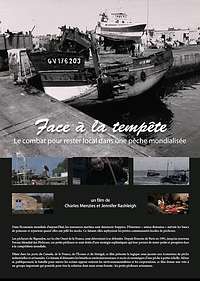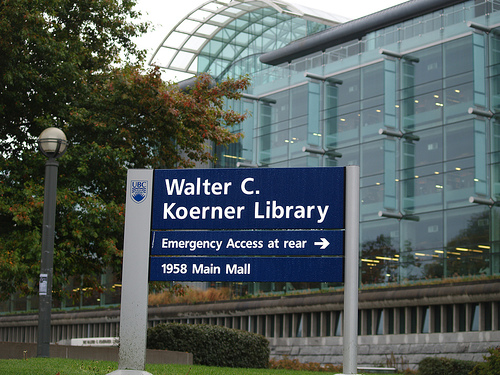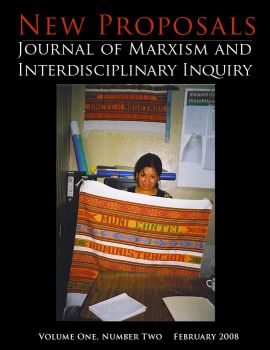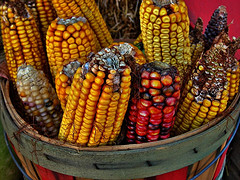October 1st, 2008 by Susan Atkey | No Comments »

This Thursday October 2, from11:30-13:00 in ANSO 205, you’re invited to a screening of Face á la tempête – Weather the Storm, the newest production of the Ethnographic Film Unit at UBC.
Drawing from more than a decade of research, UBC anthropologist Charles Menzies tells the story of small scale fishermen in Brittany France. The film is a collaboration between anthropologist and community members and filmmaker Jennifer Rashliegh.
The Ethnographic FIlm Unit at UBC sponsors screenings of new films produced by unit members and associated filmmakers.
Posted in ANTH Department, Film | No Comments »
September 30th, 2008 by Susan Atkey | No Comments »

(photo credit: western4uk via flickr)
This Friday from 10-11:30am, I’ll be doing a session on “Current Awareness Tools in the Arts“.
We’ll be looking at ways to use the research tools offered by our online resources to save yourself some valuable research time and keep-up-to-date. In this workshop you’ll learn how to use current awareness tools to:
– get notified when new articles and dissertations are published on your topic,
– get Table of Contents notifications when the latest issue of your favorite journal is published, and
– set up an RSS Reader for RSS feeds to alert you to new content in blogs, journals, databases, and newspapers.
You can register for the course here: http://toby.library.ubc.ca/booking/description.cfm?sessionid=6035
If you can’t make the session, we’ll be offering a repeat on Tuesday November 4th from 12:30-2:00 pm. Sign up for the November session here: http://toby.library.ubc.ca/booking/description.cfm?sessionid=6036
Both sessions will be held in the Koerner Lab on the second floor of Koerner Library.
Check out other offerings in the Graduate Student Workshop series here:
http://toby.library.ubc.ca/booking/searchevents.cfm?seriesid=55127194
Posted in Workshops and Tutorials | No Comments »
September 15th, 2008 by Susan Atkey | No Comments »
A reminder of tomorrow’s Anthropology colloquium:
Worlding Cities, Pied-a-terre Subjects
September 16th – 12-2pm
Green College Coach House
Co-sponsored with Center for Cross-Faculty Inquiry
The rise of Asian cities as centers of spectacle and speculation challenges conventional notions about the global city as a site of universal human rights. I argue that the ambitious Asian city is a branded state-space, a spectralized site that coordinates and generates flows of global knowledge, actors, and values. Pied-a-terre subjects, especially knowledge nomads, are recruited and favored for their production of diverse material and symbolic values. But, while pied-a-terre subjects are crucial to the prestige and wealth of the worlding city, they are the embodiment of the denationalized character of capitalism. Poised between staying and going, the knowledge nomad performs a transfer of value that shapes the hyper-metropolis as both a national space and a site of mutating citizenship.
Aihwa Ong is Professor of Anthropology at the University of California, Berkeley.
Dr. Ong is the author of many books on modernity, citizenship, sovereignty, and neoliberalism in emerging Asia-Pacific contexts. Her works can be found in Koerner Library; click here to see a list.
Posted in Talks and Seminars | No Comments »
September 12th, 2008 by Susan Atkey | 1 Comment »
Graduate students in any discipline who intend to pursue an academic career should begin to build up a portfolio of publications, particularly in high-quality scholarly journals. Getting started on this path can be a daunting task, though.
The latest issue of the journal American Anthropologist has an editorial that will help. Called “How to Get an Article Accepted at American Anthropologist (or Anywhere)”, this editorial offers 5 simple tips for improving your chances of getting your article accepted.
You can access the journal online through AnthroSource. Here’s the direct link:
http://www.anthrosource.net/doi/pdfplus/10.1111/j.1548-1433.2008.00034.x
(if you’re off-campus, make sure you have set up the VPN or you won’t be able to access it).
And here’s the citation for future reference:
Boellstorff, T. (2008). How to Get an Article Accepted at American Anthropologist (or Anywhere).
American Anthropologist, 110 (3), 281–283.
Posted in Publishing | 1 Comment »
September 2nd, 2008 by Susan Atkey | No Comments »

Whether you’re majoring or minoring in Anthropology or just taking a single class, Koerner Library is where you’ll find many of the Anthropology books and print journals, not to mention people who can help you with your research questions.
For an overview of Koerner, check out the Guide to Koerner Library to get you started. Don’t hesitate to contact me if you need help. I welcome questions and feedback from you via telephone, email or MSN.
photo credit: UBC Library Graphics
Posted in At the Library | No Comments »
April 3rd, 2008 by Susan Atkey | No Comments »

The editors of the journal New Proposals [http://www.newproposals.ca] invite submissions for Volume 2.
New Proposals is a journal of Marxism and interdisciplinary Inquiry that is dedicated to the radical transformation of the contemporary world order. All papers are peer-reviewed, and the journal is open access and fully electronic. The journal is hosted at The University of British Columbia in collaboration with the UBC Library EJournal Project.
For more on the journal’s mandate and the submission guidelines, see: http://www.newproposals.ca/
Posted in Journals | No Comments »
March 28th, 2008 by Susan Atkey | No Comments »
Earlier today I posted about new research on the domestication of maize. I heard about this news via an alerting service called EurekAlerts! from the American Academy for the Advancement of Science (AAAS).
EurekAlerts! is a global news service through which organizations engaged in research can bring their news to the media. They offer RSS Feeds (more on that in a moment) in a number of subject areas, including Archaeology.
RSS Feeds offer a quick and easy way to keep up-to-date in your area of research. By subscribing to the RSS Feed using a feed reader such as Bloglines or Google Reader, you can be alerted to any new content that is posted. To find feeds, look for the orange RSS icons on your favorite news source, blog, or ejournal:
 or
or  or
or 
You add a feed to your reader by clicking on the RSS icon and then copying & pasting the URL into the RSS reader. Anytime new content is added, your Reader will be updated.
For a quick introduction to RSS Feeds and Readers, I highly recommend this 4-minute video “RSS in Plain English“:
(Thanks to the good folks at Common Craft for their Explanation in Plain English series!)
Posted in Tips and Tricks | No Comments »
March 28th, 2008 by Susan Atkey | No Comments »

The domestication and spread of maize (corn) has been a hot topic in archaeology for a number of years. Recent research from University of Calgary PhD student Sonia Zarrillo and archaeology professor Dr. Scott Raymond using a new technique for examining cooking pots shows that the “spread of maize out of Mexico more than 9,000 years ago occurred much faster than previously believed and provides evidence that corn was likely a vital food crop for villages in tropical Ecuador at least 5,000 years ago”, according to a news report from EurekAlert, an online news service operated by American Association for the Advancement of Science (AAAS).
You can read the news alert here, or find the full article “Directly dated starch residues document early formative maize (Zea mays L.) in tropical Ecuador” in the March 24 online early edition of the Proceedings of the National Academy of Sciences (PNAS).
Posted in Anthropology in the News, Archaeology | No Comments »
March 22nd, 2008 by Susan Atkey | No Comments »
Today’s Globe and Mail has an article on an 850 BC archaeological excavation near Victoria. Archaeologists have been sifting through remains of a large house-pit, clay oven and fire pit unearthed at a housing development near the Esquimalt Lagoon.
The article is currently available for free on the Globe and Mail site, but will require subscription later on in the archives. Don’t forget that we have electronic access to the past issues of the Globe and Mail via the Canadian Newsstand database.
Posted in Anthropology in the News | No Comments »
March 13th, 2008 by Susan Atkey | No Comments »

The most recent issue of Anthropology Today (Feb. 2008 (24:1)) is out. It’s called the “Virtual Issue: War on Terror”, and it includes a number of articles on the ethical dilemmas surrounding the involvement of anthropologists and other social scientists in military and intelligence agency pursuits, including articles on the controversial involvement of anthropologists in the US Human Terrain Systems (HTS). (See my earlier posting here
for more resources on HTS.)
Some articles such as Roberto Gonzalez’ “‘Human terrain’. Past, present and future applications” are new, others have been reprinted from earlier issues for this thematic issue, including:
Buying a piece of anthropology Part 1: Human Ecology and unwitting anthropological research for the CIA, and
Buying a piece of anthropology. Part Two: The CIA and our tortured past by David H. Price
Conspiracy theories and ‘terrorists’. How the ‘war on terror’ is placing new responsibilities on anthropology by Jeremy Keenan
UBC Library subscribes to this ejournal, so as long as you are on-campus or connected via VPN when off-campus, you will be able to access the articles by clicking the links given above, or here for a full Table of Contents for the Feb. 2008 issue.
Posted in Journals | No Comments »






